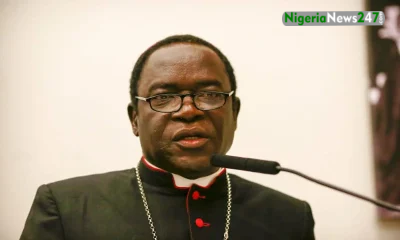NIGERIA NEWS
IMF tells FG to Halt electricity subsidy
The IMF tells FG to halt electricity subsidy stressing that Nigeria’s subsidies are projected to consume three percent of the country’s Gross Domestic Product in 2024, up from one percent the previous year.

The International Monetary Fund has warned the Nigerian government to remove what it called implicit fuel and electricity subsidies.
A recent report from the IMF highlighted that Nigeria’s subsidies are projected to consume three percent of the country’s Gross Domestic Product in 2024, up from one percent the previous year.
The IMF praised the Federal Government for taking steps to eliminate expensive and unfair energy subsidies, emphasizing that this move is essential for freeing up funds for development initiatives and enhancing social welfare programs without jeopardizing debt sustainability.
Fuel subsidies were eliminated by President Bola Tinubu’s government on May 29, 2023, but the IMF criticized the lack of immediate support for the poor and paused further actions due to corruption worries.
By the end of 2023, pump prices were kept below cost to provide implicit subsidies, aiming to assist Nigerians in dealing with high inflation and currency devaluation.
The organization also recognized that electricity prices had tripled for high-use premium consumers on Band A feeders, affecting 15% of the 12 million customers who use 40% of the electricity.
Amid calls from Nigerians to lower the Band A tariff from N206.80 per kilowatt-hour to N68, the IMF argued that adjusting the tariff would help reduce subsidies by 0.1% of GDP while still providing assistance to low-income individuals, especially in rural areas.
The IMF recommended that after expanding safety nets and stabilizing inflation, the government should address implicit fuel and electricity subsidies.
The IMF issued a warning about the increasing costs of fuel and electricity subsidies, which could reach 3 per cent of GDP in 2024, up from 1 per cent in 2023.
These subsidies disproportionately benefit higher income groups rather than vulnerable populations. The IMF recommended phasing out costly and inefficient subsidies as inflation decreases and support for the vulnerable is strengthened. It estimated that the fuel subsidy could rise to N8.4tn in 2024, significantly higher than previous years.
The electricity subsidy being paid to customers under Band B, C, D, and E was projected to stand at N540bn by the end of 2024.
According to Nigeria News 247, both the Nigerian National Petroleum Company and Minister of State for Petroleum (Gas), Heineken Lokpobiri, have consistently refuted allegations that the Federal Government was secretly funding fuel subsidies.
At the same time, the IMF’s suggestion to eliminate electricity subsidies is being met with opposition from Nigerian citizens, who are urging Minister of Power, Adebayo Adelabu, to revert the Band A tariff back to its original state.
In response, organized labor has warned of a potential protest on Monday if Adelabu does not listen to their demands.





















You must be logged in to post a comment Login